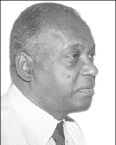
Tony BeccaLONDON:
BACK in 1950 Lord Beginner opened his famous calypso with these words, "Cricket, lovely cricket, at Lord's where I saw it", and although the West Indies did not win the second Test against England, had he been around for the three days of the 2000 contest that ended on Saturday evening, he probably would burst into song again and he probably would started with the same words.
The West Indies did not win the match, and although their batting, especially in the second innings, left much to be desired, it was a great contest, it certainly underlined why cricket is such a great game, and if the 1983 World Cup final when India defeated the West Indies is remembered as the ambush at Lord's, this Test match will be remembered as the thriller in St. John's Wood.
When the West Indies, sent to bat in overcast conditions, were 162 for one 18 minutes before tea on the opening day with Sherwin Campbell and Wavell Hinds going great guns, there was not an English man on the ground, certainly not one in the Press Box, who was not criticisng captain Alec Stewart for giving away his luck, and although they fought back admirably and picked up nine wickets for 105 runs, when the West Indies brushed them aside for 134 in the their first innings there was not a West Indian, certainly not one in the Press Box, who was not smiling.
In just over two hours, however, the criticisms were replaced by high praises and a hope for victory, the smiles by frowns and a hope for victory.
In a deadly, surprising attack, England smashed the West Indies batsmen for 54 runs, left themselves 188 to win, and despite losing one wicket after scoring only three runs, were cantering to victory at 95 for one before the West Indies, with seven wickets for 65 runs, made a desperate run in the closing stages and just failed to win a close finish.
At 160 for eight, the balance was slightly in favour of the West Indies and the tension was tight around the ground.
In a performance he will cherish to the end of his days, however, Dominic Cork, stepped in, cracked a six, smashed four fours, and as it was in 1950, fans, this time white ones, raced across the hallowed turf in a wild celebration.
Yes, the West Indies did not win, but it was cricket, lovely cricket at Lord's, and as Beginner ended his tribute in 1950, "it bound to go down in history."
One of the questions that will be asked in years to come is this: how come England, after losing the first Test so easily, were good enough to win at Lord's, especially coming from so far behind?
One reason, obviously, is that although they bowled so well, although Curtly Ambrose and Courtney Walsh bowled so well, the batsmen, the West Indies batsmen, especially in the second innings, batted like novices.
Based on television replays, there were some bad umpiring decisions on either side and one or two of the West Indies batsmen probably were not out in that resounding collapse in the second innings. The harsh reality, however, is that the West Indies batsmen died like lambs.
With Andy Caddick bowling fast and getting the ball to fly, and well supported by Darren Gough and Dominic Cork at the other end, the West Indies batsmen came and went away at such a pace that the innings lasted for a mere 26.4 overs.
Was it the result of a technical weakness? It may have been. According to Sir Gary Sobers and Sir Viv Richards who were at Lord's, Rohan Kanhai CD who watched the procession on television in his Lancashire home, most of them died because of their approach.
According to the three master batsmen, the West Indies batsmen moved the left foot first instead of moving the right foot first.
Another reason, however, is because the England team in the second innings, with the ball and with the bat, appeared inspired.
Coming out after their batsmen had surrendered in the first innings, the England fast bowlers bowled with aggression, and faced with the chance of pulling off a famous victory, the England batsmen, particularly Mike Atherton and Michael Vaughan, batted with resolve and for a change Graeme Hick, who always seems scared of West Indies fast bowlers, stroked the ball with confidence.
The star, however, was Cork.
As a bowler, Cork attacked the West Indians in both innings, and as a batsman, the man of the match backed his skill and took on the West Indies pacers, especially Franklyn Rose and including Walsh. A cut for four off Walsh and a lofted drive to long-off for an all-run four, a hook for six off Rose and a lofted drive to the long-on boundary won the match for England.
The 100th Test match at Lord's will be remembered for many things, and with the West Indies continuing their first innings on the second morning, with England dismissed in the first innings, the West Indies in their second innings, and with England starting their second innings towards the end of a day which saw 21 wickets falling for 188 runs, one of the memories will be the memory of four innings in one day.
It will be also be remembered for two magnificent bowling performances by two masters of fast bowling - Walsh who took 10 wickets in the match, including six in the second innings when he bowled the West Indies to within sight of victory, and Ambrose who, in the second innings, conceded a mere 22 runs off 22 superb overs.
Ambrose took only one wicket on Saturday, but in terms of the skill he paraded, he was as good as Walsh.
FROM THE
BOUNDARY

















































